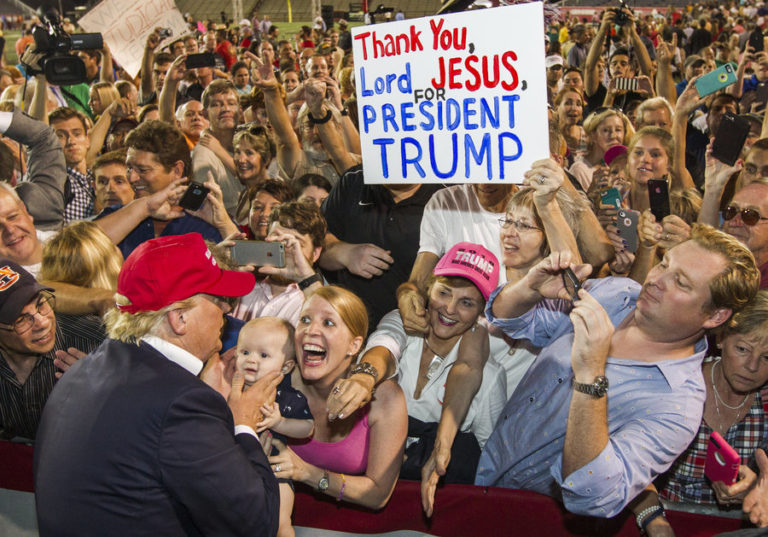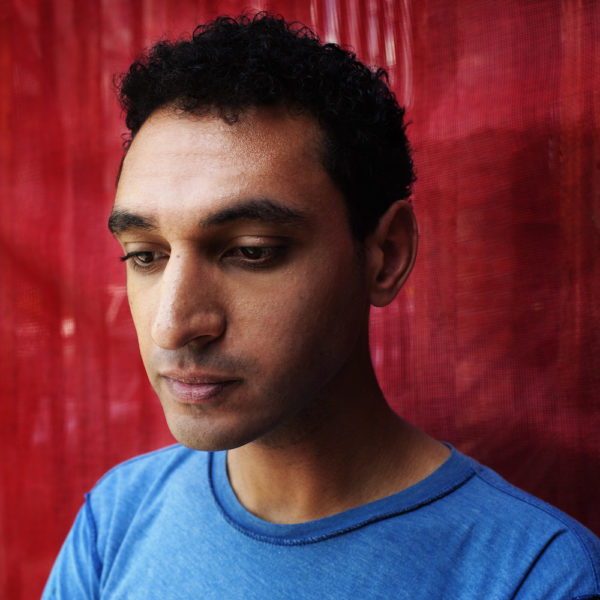
Enthusiastic supporters greet Donald Trump at a rally of more than 30,000 in Mobile, Alabama, last August. Image by Mark Wallheiser/Getty Images.
Destructive Language Has No Place at the Table
Words can ennoble us, uplift the human spirit, and lead to miraculous transformations. I’ve written about the power of words to effect transformative change in human communities. The exalted use of great language can be an agent of hope and lead us, seemingly, on the wings of angels to unforeseen heights as a society.
I believe that the opposite is also true.
If language has the power to dignify our highest aspirations, then we must acknowledge that it can also have the power to debase us. The language of destruction and hate can be as dangerous in its vile power as great language can be inspiring.
In the United States today, the language of anger, illiteracy, and self-destruction has formed an unholy trinity that is rallying furious mobs of uneducated people to express their anger against seemingly anything and everything. Even if the language of reason, order, and meter that must inform all true statecraft prevails, insurmountable damage has already been done.
New thresholds have been established for permissible visibility when it comes to the vocabulary of rage informing the tone of national discourse. A destructive mentality has escaped its polite confinement, and it may now be futile to convince those furious throngs that the United States must have a role in global leadership — to say nothing of selling this case to the other nations of the world.
It is hard to imagine these large groups of angry people reading an advertisement in a magazine, let alone memorizing poetry or studying the writings of Madison and Montesquieu, Hamilton and Hume so as to better understand the foundations of the ideas laid down by the founding fathers for this country (and all the other countries whose constitutions and founding documents were inspired by the United States). But, this is not about statecraft.
This is about shattering the establishments of court and state, fueled in equal parts by a fatalistic cynicism, deep distrust for the institutions of governance, feelings of furious disenfranchisement, and plain, dumb, blunt ignorance. Now this mass of people run free to play with their newfound fire. Avid for destruction. Complete, voluptuous, and final destruction: the terrifyingly familiar fascist desire to “tear it all down” and somehow “make it great again.”
The language of this shameful, self-destructive political circus is not just embarrassing. It has become an existential threat to the United States’ security and stability as well as its global standing. The reckless political discourse has frayed relationships that generations of American diplomats worked studiously to uphold; it has stated explicit contraventions to the United Nations Charter that the U.S. had helped to author. This language has even explicitly contradicted the Constitution of the United States itself, stunningly, to exuberant cheers from the aforementioned angry mobs.
This is an insult to a country that sacrificed its blood and resources freely to fight the rise of fascist hegemony over Europe or later Soviet domination of the world. Will we allow the mobs to hand the country over to the very ideological forces that it battled against so tirelessly? Will we allow the rhetoric of rage to decimate the alliances that generations of some of the finest diplomatic minds have worked so valiantly for centuries to preserve? Or can we find our way to insist that the tempered path of common sense prevails so that America and its allies can be preserved?
Some of the longest standing and most progressive American allies like the United Arab Emirates, a nation of almost unparalleled strides forward, have actively contained the ability for extreme points of view (like those sympathetic to Islamist movements) to take the stage in the religious and political pulpits. And for good reason: the results of their rhetoric have been world-breaking both in terms of the destruction wreaked on societies as well as individual human lives. The United States would also do well to contain dangerous extremist rhetoric and not confuse it with “liberty.”
Beyond the real geopolitical and economic ramifications, the language of violence has, tragically, resulted in a landscape where people have been murdered in cold blood because of their backgrounds. It’s a simple fact: the language of hate, when allowed to proliferate into the national consciousness, will inevitably breed crimes of hate. I wonder if it would be as easy for those who pontificate about “liberty” and “free speech” to do so while looking into the eyes of the families of those victims who died at the hands of those driven by the very same rhetoric of rage they seek to defend.
“Free speech is not hate speech” goes the current trope. I’ll happily go a step further, perhaps even into the realm of common sense. A few years ago, I wrote of “a need to use and value language more carefully and thoughtfully.” I said that there “is a need to listen to and admire thoughtful language as part of our day-to-day lives. Our highest forms of linguistic expression are a defining element of our humanity and are a key to communicating with and understanding one another.” We must also see the alternative, the rhetoric of hate and rage, plainly for what it is: self-destructive, dangerous and, eventually, deadly.
Anyone who confuses liberality, fortitude, and magnificence — the foundations of any true expression of free speech and liberty — with the proliferation of hate and the inspiration of violence will have to live with the consequences of their irresponsibility. The problem is that the rest of us might have to live with these consequences as well.
